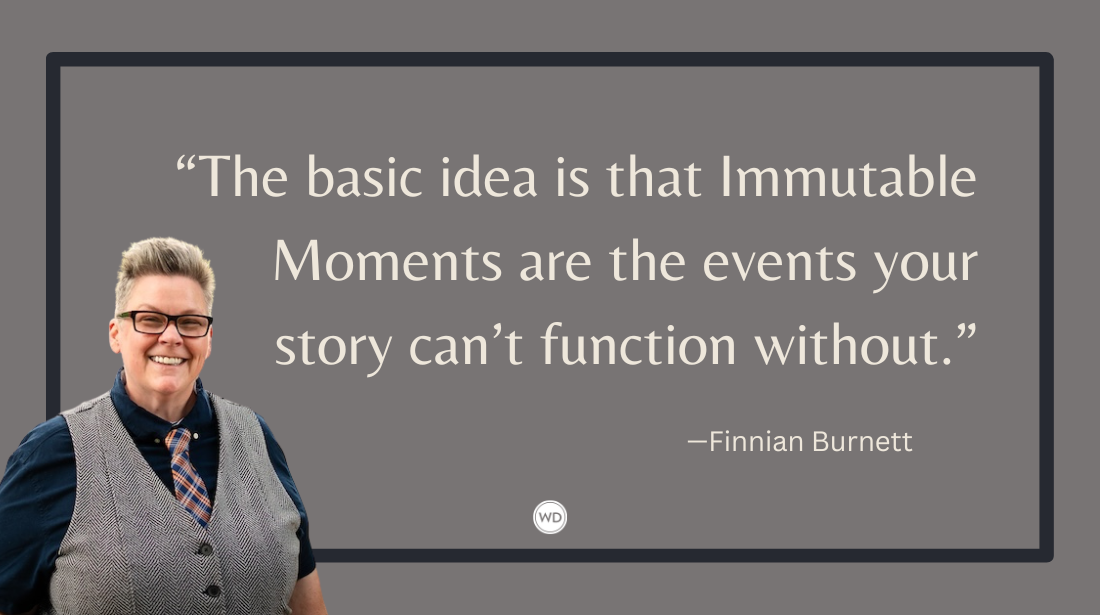8 Tips on How To Be Edited Without Losing Your Voice or Being Decolonized
When writers receive notes on what to change to their stories, losing your voice as a writer is a common and understandable concern. Here, author Anat Deracine shares how to maintain your voice during the editing process.
You’ve probably read a hundred inspirational articles about how you can hone your writerly voice by letting your soul shine out on the page and have realized that they all boil down to “Read a lot. Then write a lot.”
If you’ve made it to this line, you’ve already picked up something about what voice actually is. Not grammatical idiosyncrasies or sarcastic tone, but the sense of intimacy, of knowing that there’s someone behind these words on the page, someone who will tear off their mask and lay themselves bare. So it can feel particularly hurtful to receive feedback from an editor on your voice, and you may be struggling with making changes to your story without feeling like you’re being silenced or compromising your voice.
Above all, voice is seduction. A story with a strong voice compels you onward and inward viscerally, making it impossible to walk away. Just as there is nothing as sexy as someone comfortable and confident with their unique body, there are few things as compelling in fiction as a unique, confident voice. Here are some tips on finding and keeping yours.
1. To find your voice you need a child’s imagination.
When I was five, I once wandered off after school with a friend, convinced that twirling and dropping sunflowers on the ground would point us in the direction of home. In later years, she asked me how I’d convinced her of such nonsense. I’d truly believed it.
Voice allows you to suck a reader into a different world and keep them there. I’m currently writing a speculative fiction novel about a telepathic killer in an alternate modern-day South Asia. To make the reader suspend disbelief, I can’t just describe the world objectively; I must inhabit it. If I don’t, I can’t expect anyone to follow me in.
2. Write as if everyone you know is dead.
When a story’s voice is muffled, editors often give feedback as to how they would solve the problem; even when the feedback is warranted, you can dig deeper to solve the problem your way. Every writer needs the sanctuary equivalent of singing in the shower. If you’re too focused on publishing your work, writing becomes performance rather than expression. Write something you plan never to publish, just for the joy of it. If you don’t delight in your own voice, no one else will.
3. Don’t avoid influence, just be intentional about it.
A unique voice doesn’t just entertain you, it shapes you, changing you from within. You can’t avoid that influence, but you should recognize it so you can use it while adding your own flair. For instance, the opening paragraph of this piece was written in a similar voice to J.D. Salinger’s Catcher in the Rye. That was intentional. I used that same voice in The Divine Comedy of the Tech Sisterhood, which is a dark piece to which a satirical voice brings much-needed levity.
If you don’t allow yourself to be influenced intentionally, you will be imitating unintentionally. Your work will seem derivative, a pale reflection of something the reader has seen before. Or you might end up choosing a voice that’s inappropriate to what you’re trying to say. Imagine if Game of Thrones were written in an informal California slang, or if your favorite regency romance writer suddenly wrote their sex scenes from a neutral omniscient perspective, explaining how “one fulfilled their biological drives successfully” in the interests of the kingdom.
Think through the voice that makes the most sense for the story you’re trying to tell.
IndieBound | Bookshop | Amazon
[WD uses affiliate links.]
4. You have more than one voice.
It can take years for a writer to feel at home with a particular voice, at which point the prospect of writing differently feels like becoming a beginner all over again. When hiring artists for our webcomic, The Night Wolves, my co-producer and I realized that many artists can get stuck in stylistic ruts, recycling the same faces and body shapes and line strokes they’ve grown used to, and it can be difficult or impossible to change, for instance between American comic and Japanese manga styles. While writers aren’t as beholden to muscle memory, we too can get stuck writing in a single style.
Practice writing in different voices, from various points of view. Read authors who have truly unique voices and try to continue scenes or write epilogues in that writer’s style. Expand your repertoire.
5. In fiction, the voice we need to hear is the character’s, not the author’s.
In fiction, seeing the author’s hand at work pulls the reader out of the story. In my novel, Driving by Starlight, I had to describe the desert not through my eyes, but through those of a teenage girl. Although I grew up, as my character Leena did, in Saudi Arabia, I had to use the words that she would have.
One editing technique that helps me discover whether I’ve been successful at communicating my characters’ voices is to make a copy of a chapter and cut all the prose that isn’t dialogue.
Is the conversation still comprehensible? Can you tell who is speaking simply by what they say? If not, you’re probably doing a lot of telling as an author, rather than showing. “I’d chew my hands off before I let this break me,” is a character’s voice. She was as resilient as a tardigrade is the author’s voice, using a comparison that may not make sense if the character has never encountered tardigrades.
6. Not every voice can survive a novel’s length.
I’ll confess it took me three tries to make it through A Clockwork Orange. Any slang adds friction. Does that mean stifling and compromising your character’s voice just so they’re understood? Absolutely not. But you might consider adding multiple perspectives to your story, some more accessible to the average reader than others. Make it so that a character who is overly sarcastic, or speaks in an unusual way, becomes the salt and not the meal.
7. Voice isn’t just about snarky dialogue; it’s about laying bare what truly matters.
Driving by Starlight was originally written in the third person. The first time it was submitted to publishers, they all rejected it, for exactly the same reason—voice. They couldn’t relate to Leena, couldn’t feel her story the way they wanted to. While part of the issue might have been that a Western reader couldn’t readily relate to a girl from the Middle East, I hadn’t served Leena as well as I could have.
I’d written the story from a distance because it was a difficult story to tell, and third person had allowed me to get the story out. But I needed to slice open my own old wounds about growing up under a system of oppression, about feeling lost and alone, and bleed onto the page to let people really see Leena, and so I switched to first person. In a world of superficiality and lies, there are few things as seductive as emotional honesty.
8. You let the voice come through by getting out of the way.
Ultimately, the answer to finding your voice is to remember the story you’re trying to tell. Modern novels don’t have omniscient narrators to whom characters are pawns in a chess game. The more we try to play that role, the more likely we are to speak for and speak over the characters, silencing and colonizing them. Be the conduit for your characters, not their savior or translator.
Great writing is invisible; the reader falls into the story without seeing how it was made. Let your characters tell the story their way. The more you do that, the more you lift their voices, the more powerful your story becomes.
Anat Deracine is the author of the novel Driving by Starlight (Macmillan, 2018), a story about a girl growing up in Saudi Arabia; she is co-creator of an online comic called The Night Wolves; and author of many short stories, including The Divine Comedy of the Tech Sisterhood which highlights inequalities in technology.








